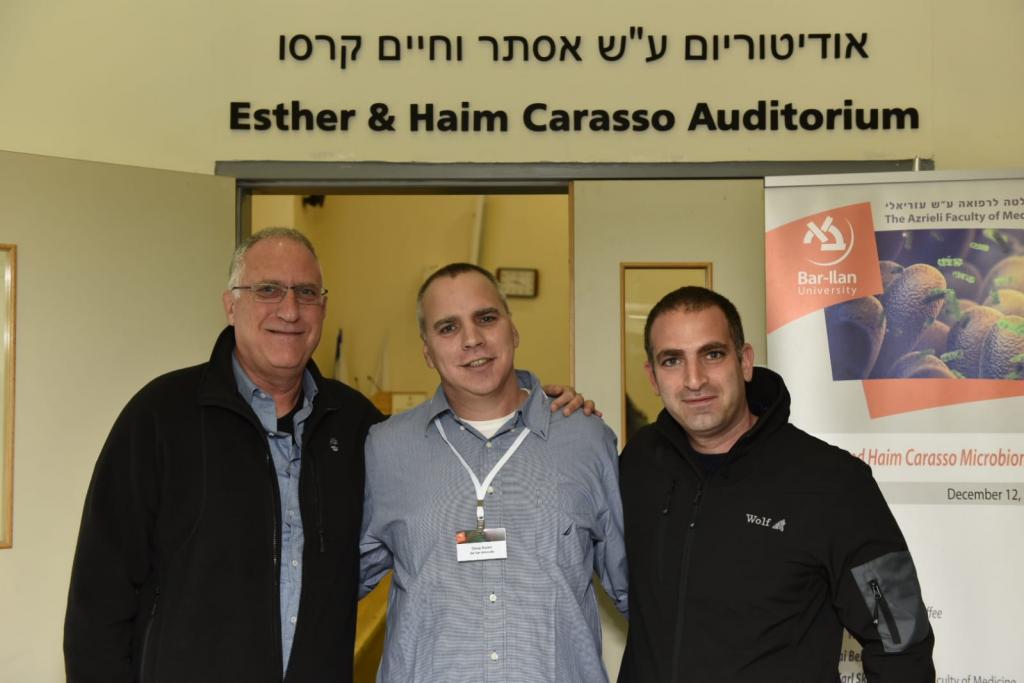Microbiome, The Nano Frontier of Medicine: 2nd Microbiome Israel Workshop held at Azrieli Faculty of Medicine, December 12, 2019

The Azrieli Faculty of Medicine hosted the Esther and Haim Carasso Microbiome Israel Workshop to an over-subscribed, standing-room-only audience. Opening the day, Dr. Shai Bel thanked the participants for coming to Safed. Bel tied in parallels between the large yeshiva constituent in the city, and the university – its dedication to learning, the necessity for family cooperation, and jokingly even mentioning the lack of remuneration for the long hours put into the studying.
Dean Karl Skorecki then welcomed the crowd, warmly thanking the Carasso family for their generosity. He shared that Carasso and microbiome are the two most frequently heard words at the Faculty – Carasso as the main Faculty auditorium is named the Carasso Auditorium. He admitted that in the past he had been skeptical of microbiome research but as of taking on the role of Dean one year ago, and being exposed to the Faculty labs, he has become a convert. The Carasso family members were then presented with tokens gifts, accompanied by applause of appreciation.
The first session, sponsored by Ilex Biotech, opened with a presentation by Eran Segal of the Weizmann Institute. He gave a brief overview of the Personalized Nutrition Project that is making international headlines. According to his research, an “algorithm diet” may be more successful at reducing the incidence of diabetes than traditionally accepted guidelines.
Yoram Louzoun of BIU’s mathematics department took to the podium next, introducing the audience to the possible role of microbiomes in allergies. By looking at one’s microbiome will we be able to identify allergies? Perhaps even cure them? How long will it take?
Ravid Straussman of the Weizmann Institute then brought in some historical background related to microbiome tumor research and stressed the necessity of being especially careful when carrying out studies and arriving at conclusions. He looked at breast cancer and also at smoking behavior. Hopefully one day bacteria will be a useful tool in fighting cancers.
Naama Geva Zatorsky of the Technion discussed mining the gut microbiome, looking at healthy microbiome and the immune system. And, is microbiome behavior static, or does its function change?
Yehudit Bergman of the Hebrew University, a specialist in epigenetics, mentioned how the intestine is a wonderful place to study environmental challenges. She suggests a very strong link between microbiome, inflammation, and epigenetics.
After the lunch break and poster session, Itzick Mizrahi of Ben Gurion University opened up the first afternoon session, sponsored by Rhenium. His presentation included an evolutionary explanation of the development of microbes up through vertebrates. Studying fish as well as ruminants (cows), Mizrahi, among other ideas, tied in global methane levels to the topic at hand.
Yael Haberman of Sheba Medical Center then discussed the recent increase in inflammatory bowel disease (IBD), suggesting that genetics cannot account for such a drastic change, for the “epidemic,” but rather, industrialization and westernization. Why do some people respond to medication, while others do not? Where do antibiotics fit in, considering recent microbiome research?
Noam Shental, a computational neuroscientist at the Open University sets as one of his research goals, profiling bacteria in tumor microenvironments.
And Evan Elliot of the Faculty brought up another area – the interaction between genetics and microbiome in autism. It is known that ASD is often accompanied by gastrointestinal issues, and there has been anecdotal evidence pointing to ASD symptoms and antibiotics. This frontier is also being explored.
After a brief coffee break, the second afternoon session opened with a clinical talk by Ilan Youngster of Assaf Harofeh hospital discussing fecal microbiota transplant (FMT). He cited encouraging cure rates, mentioning Clostridium difficile and even GvHD (graft versus host disease), a side effect of some aggressive cancer treatments.
Iris Dotan of Beilinson Hospital then gave some insights on IBD, especially with regard to the Israeli population – immigrants, and year of immigration. She stressed that this is exclusively a human disease, and mentioned the risk of causing antibiotic resistance and the possibility of treating some illnesses such as pouchitis (inflammation) via diet.
Eran Elinav of the Weizmann Institute discussed the microbiome-gut-brain axis, having studied ALS in mice and humans. He, like other researchers at the workshop were careful to point out the difference between causation and correlation.
The final presenter was Omry Koren of the Faculty. He has spent much of his time studying microbiome changes during pregnancy, finding that bacteria react to hormones. He tied in diabetes, newborn antibiotic exposure, and sex differences. Koren signed off the most eye-opening conference stressing, “Humanity is a passing episode in the life of bacteria.”
For more information, feel free to contact the Faculty.
Pictured left to right: Arik Carasso, Omry Koren, Eran Carasso
Last Updated Date : 15/12/2019



